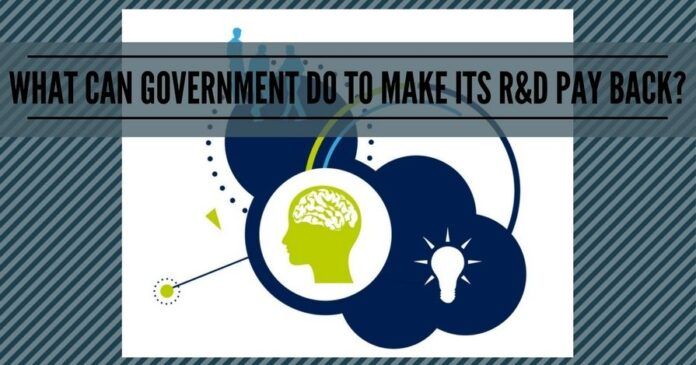
The Government should facilitate its R&Ds to commercialize their patents, and offer incentives for private sector to invest in R&D.
When we talk of ‘Make in India’, we’re referring essentially to manufacturing conventional products & services where the value addition is small. It is in respect of original new products/ services where the value addition can be substantial, which is what can help a nation become rich. Israel, despite its small population and severe resource constraints, has become a major power in science & technology because of its R&D. Even Israeli expats excel worldwide as scientists and entrepreneurs, more than any other community.
The maximum value addition in products & services comes from R&D. Developed nations are what they are because of their focus on R&D, especially by their private sector and Universities; Government participation, as a %, has been much less in comparison in these countries (though in money terms, it is substantial compared to India).
India has been lagging behind for long, but the trend is turning relatively positive, though very slowly. Indian Government has so far spread its investment in almost every conceivable area of science & technology, like Defence, Aerospace, Atomic Energy, Agriculture, Biotechnology, Ocean Sciences and all other realms of science and technology (like Structural Engineering, Electrochemistry, Leather etc, mostly under CSIR).
Our private sector has not been playing its due role, resting content copying products and services from developed countries. Our Universities are nowhere close to those in developed countries in terms of R&D.
Despite all the constraints, ISRO has developed professionalism and has been able to deliver excellent results.
So, when we talk of R&D in India, it is our Government that has been the major player. Our investment is grossly inadequate to take our economy anywhere in the league of leaders in Science & Technology, which alone can take us into the big league. Compared to leading economies like US, Germany, China etc. which spend 2 to 4% of their GDP, India spends only 0.69% of GDP. We’re doing still worse in terms of the outcome of money deployed.
Though our Government R&D organisations are doing their bit, we should recognize that management anywhere, including in R&D, can never be as good in the Government as in the private sector. Added to this is the fact that these R&D organizations are almost completely managed by scientists, rather than by subject matter experts. So, it has resulted in in-breeding with grossly sub-optimal outcomes.
For example, whether it is marketing & selling their patented products/ services to industry, or creating R&D infrastructure, or even public relations, it is mostly scientists who are in charge in most of the R&D institutions. They are not even adequately oriented and trained. Most decision making is by scientists in the form of committees.
The result has been a thorough lack of professionalism and wastage of precious time of scientists. Also, most of the scientists are working on projects which may or may not have relevance to the society. Even where projects of relevance to the society are taken up, they are left to fend for themselves to solve their technical, commercial and administrative hurdles. Finding that the task of solving their problems is beyond them, and no one bothers whether they commercialize their work or not, they just end up publishing papers and filing patents that will never be commercialized, which incidentally is appreciated.
ISRO has been a visible exception. Despite all these constraints, it has developed professionalism in the organization from the start and has been able to deliver excellent results. In fact, ISRO is an example of what is possible by Government R&D organizations.
In the developed countries, there are multi-functional experts to assist all through the development process.
NDA Government tried to bring in some level of accountability, but it does so by pruning their budgets and asking them to generate internal revenues by commercializing their patents and manage their budgets with such income. Though pushing someone into the water and letting them learn to swim is one way to make them shape up, a far more effective way is to facilitate them to succeed, by helping them find solutions to their problems in commercialization.
Converting R&D patents to commercial products & services is not simple. There are many steps involved. Every patent will normally have many gaps to be filled before it can be ready for use as commercially viable products & services. Often, the concerned scientists won’t even be aware of these gaps.
Even after becoming aware, there will be many challenges, like product engineering, applying standards to the design, making the products/ services commercially viable, finding clients who will be willing to give a chance for pilot scale implementation, improving the product/ service iteratively, marketing & selling, installation & commissioning, continuous improvement, and so on.
Expecting every Scientist to do all of these is intrinsically flawed. In the developed countries, since R&D is part of private sector’s business, there are multi-functional experts to assist all through the development process and to take over from the scientists and commercialize patents, and so they succeed.
The incentives should be thought through well, or else most companies will show some of their regular expenses under R&D.
Despite these constraints, if some Government scientists commercialize their products/ services, it is only because of the ecosystem provided by the few specific departments and/ or the perseverance of the specific few scientists.
Scientists, in general, do not have multi-functional expertise. Multi-disciplinary teams (like marketing & sales, product engineering, costing, etc), should be formed to assist the scientists in this process. They (and their support staff) should be trained in all relevant facets to be entrepreneurs with meaningful stakes in their work. This will motivate them to commercialize their work, and they will work on these products and services even after retirement pro bono because they will make their money from their stakes.
Private sector should be incentivised to invest in R&D. The incentives should be thought through well, or else most companies will show some of their regular expenses under R&D and claim tax breaks cleverly. Services (including the futuristic Internet of Things, AI, Robotics, Big Data Analytics, eCommerce, etc) is one sector where Indian private sector is strong and hence can focus on. Defence manufacturing has tremendous potential for application of some of these upcoming technologies from the service sector.
Summing up, the Government should encourage more projects to be taken up that have commercial applications (than mere paper publications and paper-patents) and facilitate its R&Ds to commercialise their patents, and offer incentives for private sector to invest in R&D, if we are serious about Make In India as a long-term plan.
Note:
1. The views expressed here are those of the author and do not necessarily represent or reflect the views of PGurus.
- How BJP can get 33%+ vote share in TN - April 1, 2024
- A transparent, equitable electoral funding alternative - March 19, 2024
- How TN BJP can come to No. 1 or No. 2 in 2024 LS polls - January 11, 2024











Dear Mr Sreeram, Thanks for your nice words.
Governing such a large & diverse country is not easy. Most of the Ministers and many IAS officers are competent, and committed. They’re doing a good job. Our suggestions are just to add outsider perspective which they obviously cannot have otherwise. Our contributions are just a drop in the ocean.
The Govt has mechanisms to hear such suggestions, but my only wish is these mechanisms were even better.
Democracy functions better with people participation and our efforts are only in that direction. Let’s not despair. IMHO, broadly we’re doing fine, but as always, things could be even better.
I do not know each central govt has so many ministries, except PM & Foreign office seems to be working. Did none from other ministries have anything to contribute. They do not know what needs to be done ? They can take ideas from Mr. Ganesh. It is a case of all ministers are incompetent & have no idea or knowledge for their own ministry or domain to do any reform. They only spend 5 years, enjoy benefits & get away.
It is time that ministries are head by Technocrats NOT by IAS babus or uneducated Ministers. Certain Ministries by default are required to be headed by Technocrats ONLY.